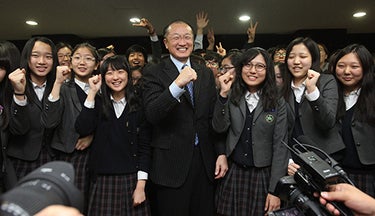
As countries strive to grow, build well-being and fight inequality, it is clear that education must adapt to changing global needs. This is true in all country contexts, including in advanced economies such as the Republic of Korea, where a high-performing education system already turns out skilled students who top the charts in international learning assessments such as PISA and TIMMS.
After attending a symposium earlier this month that the World Bank Group co-hosted with the Korean Educational Development Institute, I realized why the Korean education system is so highly rated and progressive. Not only has the system rapidly evolved to produce some of the best academic achievers in the world; it is also very self-reflective. Koreans, with their remarkable drive for self-improvement, now want education to take that same trajectory – and are striving to create an education system that places less stress on students and their families and focuses more on the development a strong creative economy.
In the conference draft of a World Bank Group paper entitled Intelligence, personality, and creativity: Unleashing the power of intelligence and personality traits to build a creative and innovative economy, presented at this symposium, authors Beth King and Halsey Rogers note that modern education systems are challenged with building two types of skills, cognitive and non-cognitive. Both contribute to workplace productivity and creativity. In a panel discussion I participated in, we emphasized the importance of non-cognitive skills such as perseverance and openness to failure, which are just as important as cognitive skills in determining productivity, creativity and performance.
Korea’s education system promotes high cognitive achievement and also some non-cognitive skills such as grit. It also produces 15-year-olds who are, by a recent PISA measure, the most creative problem-solvers in the world. However, the system is also associated with heavy financial and psychological costs for families that may stand in the way of a healthy, happy educational experience and inhibit non-cognitive skills. Reform of the stressful and narrow university admissions process—to search for talent well beyond just academic grades—is an urgent priority for the country's policymakers.
Beyond the education system, does the Korean economy make the best use of skills and creativity that students bring to the workplace? The answer, of course, is that there is room for improvement here as well. During his keynote speech, President Kim urged Koreans to dismantle hierarchies related to age and gender so that the Korean economy could continue to grow and living standards to rise. Citing a number of hard-hitting statistics—including that Korean women earn 37% less than Korean men, the largest such gap in an OECD country—he urged Korea to create a "meritocracy of ideas" and a workplace culture that is supportive of women and youth.
From what I saw of elementary and middle schools while I was in Seoul, it is clear that the Korean government is taking the issue of balanced skills development seriously, and the Korean system will continue to offer interesting lessons as it reorients itself to the needs of the future.
Follow the World Bank education team on Twitter: @WBG_Education
Related
World Bank Group President Suggests Korea Needs to Unleash Creative Potential of Students, Women, Young Workers
Webcast: Innovation in Korean Education for a Creative Economy


Join the Conversation